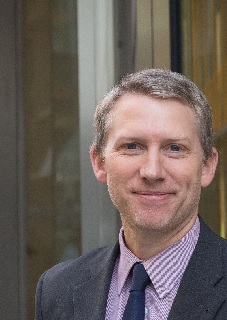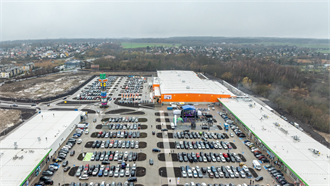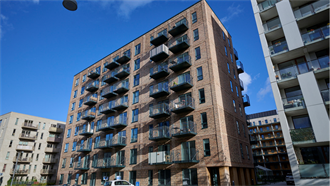Four senior real estate leaders gave their views on the current state of the European real estate market during a recent ULI Europe webinar.
Erik Sondén, a Paris-based senior advisor at DTZ Investors, kicked off the ULI Europe Capital Markets webinar with a note of scepticism concerning real estate deals being announced of late.
‘Activity in the capital markets is very low,' he said. 'The number of deals announced as having been initiated during Covid-19, I do not really believe from my perspective in Paris. Basically, everything I have seen that has been realised over the past six to eight weeks have been things initiated prior to Covid-19.’
The Swede explained it was ‘very complicated’ in today’s market to initiate discussions with new capital. 'The market has become very cautious and there is a lot of prudence.’
Sondén suggested France has a ‘chaotic situation’ today, but noted that things were starting to come back to a more normal situation.
Construction work (DTZ has a couple of projects ongoing) is absolutely normal and is functioning well.
‘But if you want to initiate a conversation with your bankers, it is complicated, unless it is a question of extensions, which are quite easy to obtain given the very strong support from the French state,’ he said.
Roger Orf, partner and vice chairman of Apollo Global Management, said Apollo's offices were closed until September with the exception of Asia.
He explained: ‘We spent the first month or two looking at our existing book of business and battening down the hatches. But we have taken a relatively proactive stance towards real estate acquisitions really focussed on the public markets.’
The company is in the process of making a successful €170 mln bid for UK logistics REIT, Atlantic Leaf.
‘The lesson is that the public markets have reacted quickly to this downturn and reflect current market value. However, whilst we are looking carefully at the direct market, I would not expect meaningful activity to begin until the autumn.’
Richard Johnson, MD and head of international capital markets at Signa Financial Services, said staff had had full access to the Zurich office for around six weeks, though the office population is low and restricted.
‘Life outside in Switzerland looks pretty normal. Today, I have only seen one person walking around with a mask. But on the business side, at the start of the pandemic there was a lot of circling of the wagons, looking at issues faced versus what one might face in the future and prioritising those. It has been a similar reaction with partner banks and investors.
‘Existing relationships have worked very well with Zoom, telephone and old-fashioned reliance in trust having been built up over time. Developing new relationships has been difficult and therefore most of the last three months have been on dealing with existing matters.'
He added: ‘I think as we are able to have face-to-face meetings, it begins to look a bit more like normal life.’
New deals versus existing assets
As some markets begin to resume some semblance of normality, webinar moderator John Barakat, head of real estate finance at M&G Investments, asked about time management. 'If it is a given that in the first few weeks of the crisis, companies were spending 90–100% of their time on the existing book, how is the percentage versus new opportunities today?'
Apollo is 90%-focused on new acquisitions if one excludes ordinary asset management which is ongoing.
Signa is spending 60% of time on new acquisitions. In March, it was spending 80% of its time dealing with existing assets.
DTZ Investors is spending 80% of its time on existing investments for its separate account mandates and 80% on new acquisitions for its funds.
Equity capital
Barakat further asked: ‘Are investors open to talking about new strategies and committing new capital, or is the equity market on the private-side really shut down?'
DTZ’s Sondén said: ‘We find all our existing clients want to put off any decision until September.’
Signa’s Johnson explained: ‘I think people are willing to begin a conversation but no action this side of the summer.’
Apollo’s Orf: ‘We are in fundraising mode in North America and Asia and we have had a first close in North America recently during Covid-19. But I think in the main, investors are a bit like us.
‘They are open to new opportunities, but they have really switched from growth opportunities to wondering what the distressed market is going to look like, which makes them a little bit paralyzed in terms of making commitments so it has been quite slow of late.’
Travel restrictions
Travel remains an issue. Johnson said the realistic opportunity of building a decent business trip to say Japan or Korea this side of Christmas seemed unlikely. ‘It might happen, but unlikely. It is pretty much a given that the next 5 - 6 months are going to see local travel becoming more likely. But I am not aware of many people having face-to-face meetings in London now, so to go to another part of the world seems more unlikely. Clearly trips to north America might also be put back by 4 to 5 months in my mind.’
Orf said it remained extremely difficult to organise meetings. In fact, he had just organised the first lunch for the last four months.
He explained: ‘For existing clients, what we are doing in an extended period of shutdown is Zoom and such-like. Whilst it is not perfect, they do understand that it is the best we can do in this environment.
‘In other areas, including real estate, but also other areas of the firm, we have closed significant amounts of capital because the Covid-19 period connotes distress and that is an area of speciality for the firm.’
DTZ’s Sondén remarked: ‘The wall of capital is not going away, so we need to figure out a way to do this if we cannot travel. We are holding face-to-face meetings now.’
He also remarked that ‘brand’ is going to become even more important. ‘If you are a well-known name, that is going to have a huge impact.’
Start-ups
Orf observed that the current climate was 'a perfect time' for a start-up. 'Retail is an obvious place to start. Where new names emerge, they will have a track record in a particular area of focus. They will initially start on a much smaller scale than the likes of us, but ultimately can become a major force in the industry,' he said.
M&G’s Barakat said: ‘In a sense, start-ups are the life blood of creating new opportunity in the real estate sector. That is how we regenerate ourselves.’
Debt financing
The availability of debt is another hot topic. Sondén said that in the French market, he could only see debt financing available in the low-risk segment (core to core-plus). He believes €50 mln is more or less the maximum, otherwise banks will syndicate. Margins have not moved up hugely.
Apollo’s Orf added: ‘The world we live in is the small opportunistic world. There we can find debt - €100-200 mln is out there. Margins have moved up depending on the covenant and length of lease. Margins have moved up 25–50%. In our NPL business, borrowers we are selling to are finding it very difficult to get local based loans partly because of summer but also Covid-19.’


































